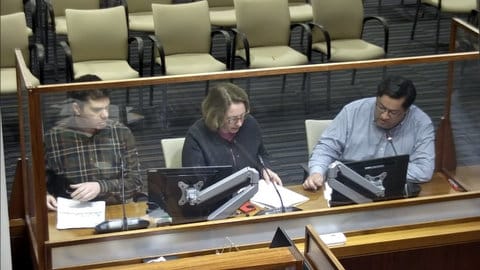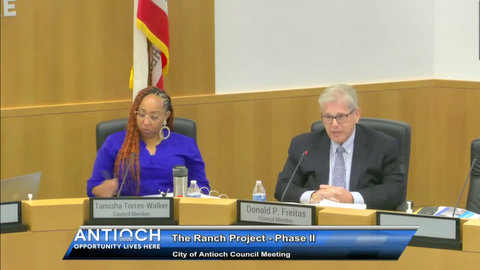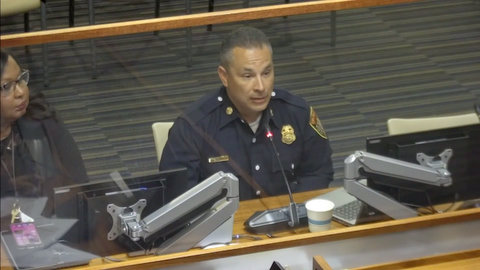
21 Feb Looming Closure of Alta Bates Threatens to Worsen ‘Hospital Desert’ Conditions

Berkeley officials — from left, health commission chair Andy Katz, City Council member Sophie Hahn and Mayor Jesse Arreguín — spoke at Tuesday’s Richmond City Council meeting. (Screenshot captured by Samantha Kennedy / The CC Pulse)
By Samantha Kennedy
As the planned closure of the Alta Bates Medical Center nears, the “devastating impact” on the region might be just beginning.
The Richmond City Council on Tuesday received an update on the closure from staff of the city of Berkeley, where the hospital is located, detailing what this means for cities like Richmond.
The hospital, which Sutter Health owns, had the highest number of live births in the region at the time of the study and continued to increase. The loss of labor and other emergency services would force West Contra Costa residents to travel further for treatment for potentially life-threatening conditions.
Black Infant Health Helps Black Moms ‘Give Birth the Way She Wants’
A hospital desert “is what we see becoming even more pronounced if and when Alta Bates were to close without our communities organizing for maintaining those services,” said Andy Katz, Berkeley’s Health Commission chair.
Sutter’s planned 2030 closure announcement in 2015 coincided with the shutdown of Doctors Medical Center in San Pablo that served around 250,000 West Contra Costa residents, most of who were low-income and received Medi-Cal. A year later, discharges of Contra Costa residents from Alta Bates increased by 30% since 2013.
The region was already “rapidly facing a hospital desert situation” when Doctors closed, according to Katz. Other emergency departments in the area, the closest being Richmond’s Kaiser for many, saw an influx of patients that the hospital wasn’t always able to treat.
“If you are facing a heart attack, you are not able to go to Kaiser Richmond to save your life,” Katz said. Patients must go to another hospital, sometimes by an airlift from Kaiser, to receive proper treatment.
Berkeley Mayor Jesse Arreguín and council member Sophie Hahn said Sutter Health proposes that patients who would typically use Alta Bates instead go to the campus in Oakland. The Oakland location has “significant emergency wait times,” according to Arreguín and Hahn’s presentation.
“Your ambulances are going to have to go through the [MacArthur] Maze, and the maze is 10 miles itself because it’s always backed up,” Hahn said. “It can add 45 minutes or an hour.”
In addition, Arreguín said, Sutter has not taken out any permits for additional facilities that would accommodate the increase in emergency patients at Oakland’s location.
The closure would especially impact vulnerable populations, such as those who are low-income, people of color, and people with disabilities. Black residents in Richmond and San Pablo had the highest health concerns due to diabetes, heart disease, and cancers at the time of the study. From 2013 to 2016, Alta Bates had a 62% increase in patients from San Pablo and between 32% and 41% in Richmond ZIP codes.
In meetings with Alta Bates and Sutter, according to Hahn, the facility and its owner have not offered any solutions that would keep the hospital running.
“We ask them, ‘What do you need? . . .We’ll go to Richmond, we’ll galvanize, we’ll talk to our residents. What do you need,’ ” Hahn said. “And we’ve never gotten a response.”
If Alta Bates does close despite community efforts to keep the facility open, Arreguín said an alternative needs to be found to serve residents.
“At some point, we have to take control of our own destiny,” Arreguín said.
SOS Members Talk Impact, Future Goals
Several Safe Organized Spaces, or SOS, members spoke during public comment on the impact the organization has on the community and how they hope to continue with the support of the city.
“We have a clear path on what we want to do, and we feel very confident in doing that,” said SOS director Daniel Barth.
Funding for SOS, however, has not been renewed beyond February, according to the director of SOS Operations, Tomi Nagai-Rothe.
“We’ve sent in our budget, and we need your support to keep doing the work,” Nagai-Rothe said.
>>>Q&A: ‘We Need to Now Build New Approaches to Homelessness’
In 2024 and 2025, SOS wants to continue working with those in encampments and providing services outside of them to give them opportunities, Barth said. The organization is also planning on opening a wellness center and job readiness program next month.
Members of SOS, some of who were once unhoused themselves, said the support and opportunities from the organization allowed them and those they serve to stay connected with what they need.
“Thanks to SOS I’m standing here,” Leyla Williams, an SOS employee who was once unhoused, said. “I think SOS is a vital link in the community.”
City Manager Extended
City manager Shasa Curl will serve in her position through April 2027, a two-year extension of her previous agreement.
The extension includes an increase in compensation and additional protection from termination.
Original compensation increases for the years 2024 and 2025 were 4% or the consumer price index, whichever was greater. That increase has moved to 5% for each year and will be the same through 2026 and 2027.
Curl’s agreement also is amended to prohibit her termination 90 days after an election. For that to be followed, one or more council members must have been elected in that election.
First appointed as the interim city manager in 2021, Curl has worked for the city of Richmond in various capacities since 2003. Beginning in 2011, according to a staff report, she has served in positions such as deputy city manager and director of Community & Economic Development.
>>>Q&A: New City Manager Shasa Curl on What ‘Makes Richmond Unique and Special’
“What’s happening in Richmond is a new day,” council member Doria Robinson said. “And I think it’s largely….a result of the city manager’s leadership.”
The next Richmond City Council meeting is on Feb. 27.






No Comments